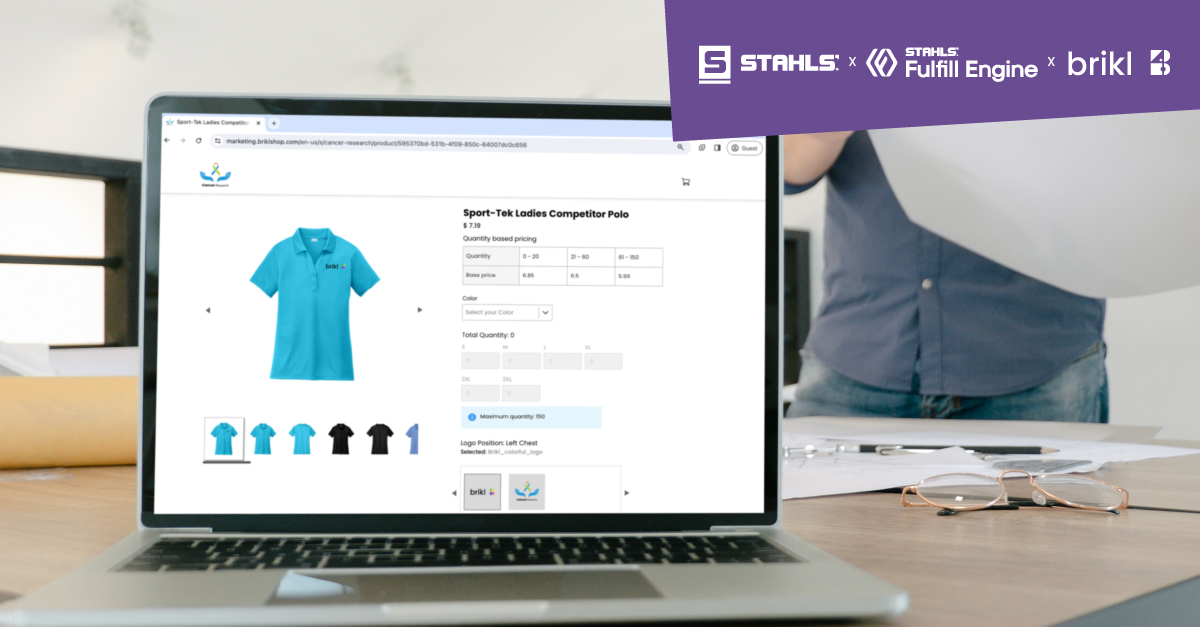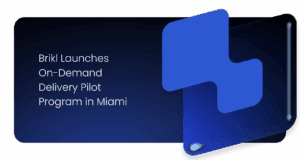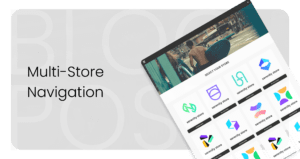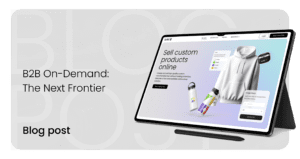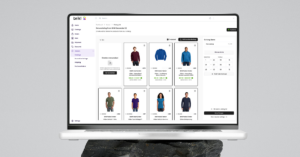With the launch of the news that Brikl, STAHLS’ and STAHLS’ Fulfill Engine have teamed up to deliver on-demand at scale, we celebrated the partnership with a webinar. Our Next-gen Integrated Online Stores and Fulfillment webinar outlined how the need for speed, quality, and ease of use are redefining the standards of e-commerce and fulfillment services.
As more businesses are waking up to how savvy investments in technology can eliminate friction in the order process, elevate customer experience, and safeguard sales, we discuss how the on-demand process can seriously amplify what businesses in the industry thought was possible.
This article delves into the key takeaways from the webinar, highlighting the insights shared by our industry experts and speakers:
Where the market is heading
One of the central themes of the webinar was integrating advanced technology in building online stores. As Suz Pathmanathan, VP of Marketing at Brikl, underscored, the focus is on creating platforms that are not just user-friendly but also robust in their functionality. The need for specialized features like supplier integrations, app ecosystems, and comprehensive reporting is more crucial than ever in today’s digital commerce landscape. With the market moving towards the aspiration and application of on-demand production
Poll insight: Brikl asked the audience about their current obstacles when setting up online stores on demand: 50% answered that they don’t know where to start, and the other 50% answered that lacking internal resources is a key obstacle.
Jayson notes that there are a few important considerations when it comes to on-demand.
“A consistent question from our customers is, what’s the minimum? The answer is one. That’s a huge plus. And there’s no maximum. It’s not having all your eggs in one facility basket where their physical capacity constrains you. Having the ability to have load balancing across entire states, across the globe creates the ability for you to go sell and not have to worry about running out of capacity because you don’t have all the capacity running through one facility”.
Looking back
Ten years ago, there were significant hurdles if you wanted to place an order for just one item. You had to set up a screen or digitize the artwork, and there were all these setup costs. No software existed to optimize the actual production of the order, making the cost incredibly expensive. This is why you didn’t see on-demand orders.
Companies had bulk inventory that facilities would hold, allowing production ahead of time, but this model had many disadvantages.
“Fulfill Engine’s partnership with Brikl and STAHLS’ changes this,” Jayson comments.
“We’ve built a system that empowers you to offer various products, styles, and designs on demand. Customers no longer need to take an inventory position, and neither do you”.
Brikl, integrated with the Fulfill Engine, provides decorators with an order management solution that optimizes their workflow. The software knows what thread is on which spool on what embroidery machine and communicates with the DTG machine. It’s automated and integrated with STAHLS’ for direct-to-film printing.
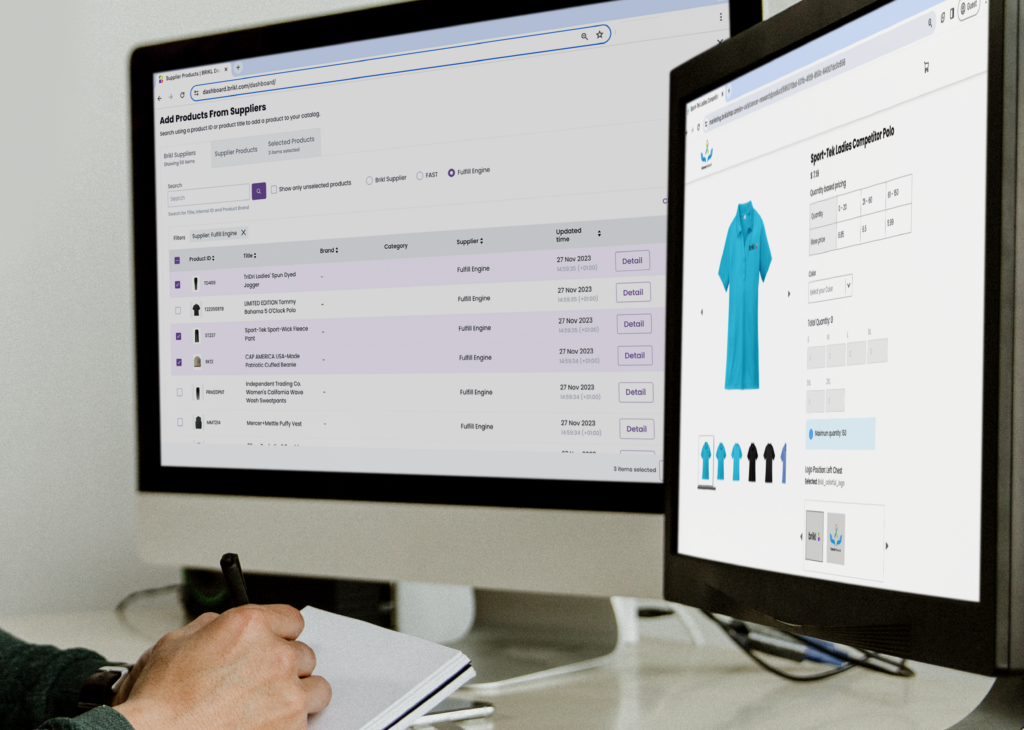
Everyone can access these products, enabling you to offer your clients more styles and products for their company stores or gift platforms without the upfront costs. The on-demand model is powerful, and the industry is shifting towards it. It’s about staying ahead of the game rather than playing catch-up.
💡 Top tip: Sign up for our webinar with Journey.io to learn about next-generation storytelling. Create journeys, not slideshows, to drive sales.
And the decorator network isn’t just a black box; it’s transparent. Brikl’s software shows where orders are routed and who’s doing the production. It’s not about dumping orders on a facility and hoping for the best. Our software drives the fulfillment process, ensuring consistency regardless of where the product is produced—Manchester, California, or Charlotte.
Fulfill Engine’s technology also manages capacity and capabilities, directing orders to the nearest decorator with the right equipment, saving money on shipping, and reducing transit times. This creates a better experience for everyone, from getting an order to the final customer.
Lastly, there’s a significant talking point in the industry about on-demand services. Some claim they offer on-demand apparel or hard goods, but often, they need help to fulfill this promise effectively.
The lure of zero-inventory
The emergence of zero inventory opportunities has significantly transformed the landscape of on-demand services and drop shipping. Suppliers like SanMar, S&S, alphabroder, and others have played a pivotal role in boosting our success as they stay ahead with on-demand printing and fulfillment.
It’s beneficial to have dynamic and seamless partnerships across the industry. This collaboration has simplified the process, creating an efficient cycle that’s easy to navigate.
Fulfill Engine’s system processes orders through decorators and tracks the inventory of blank shirts from suppliers, with plans to add even more. This means you no longer need to manage inventory or worry about placing purchase orders for blanks or sourcing goods. Our system covers everything, allowing you to focus on servicing your customers and selling.
Brikl and Fulfill Engine provide the tools for this simplified approach, like an ‘easy button’ that our industry has been waiting for. This shift allows distributors to view and manage products in one place, eliminating the need to log into multiple supplier websites to check stock, inventory, and pricing. Everything is centralized in one location.
“Brikl has heavily invested in the customer and distributor experience, particularly in product selection. The boundary between apparel stores and hard goods is now a thing of the past. Customers can access a mixed assortment of hard goods and apparel in a single store through our decorating network,” Jayson notes.
Zero inventory and enhanced customer experience go hand in hand, offering the ability to scale, test, change, or add products seamlessly. This flexibility enhances the customer experience by allowing adjustments on the fly, simplifying the journey, and automating it. It’s about enjoying the process, where a customer can order a custom item and receive it just days later, culminating in a delightful unboxing experience.
The advantages of on-demand fulfillment
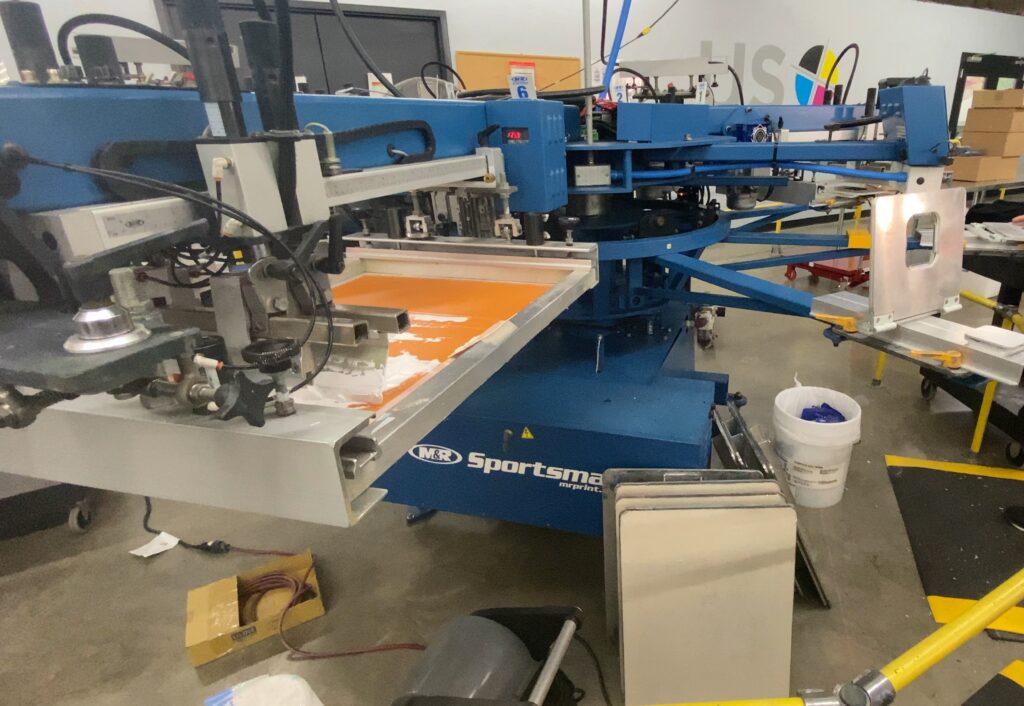
Is there a trade-off if the customer doesn’t have to pay for holding inventory? Yes, because not having to hold inventory offers significant benefits. It allows for the best of both worlds.
Consider golf balls, for example. Customers may want them printed with a specific design, which traditionally requires holding a large inventory. However, with on-demand services, these can be added to the store as needed. This provides flexibility and addresses various customer preferences without the need to hold or manage large inventories.
This flexibility is crucial, especially at the enterprise level, where RFPs are competitive. A common concern in these proposals is who will hold the inventory and bear its costs. No one wants to hold inventory; it ties up funds. The Brikl-Fulfill Engine approach offers a cost-effective solution by eliminating the need for excess inventory, which often results in unsold, dead stock.
By only producing what is needed, customers avoid the cost of unsold inventory, often making the overall spend the same or less compared to traditional bulk orders. This efficiency is a significant advantage when seeking to win business from large accounts. No company wants to invest millions in inventory that may not sell.
On the other end, this model also benefits smaller clients. Previously, setting up an online store for a small local company with limited employees took a lot of work due to the management involved. These smaller businesses become viable clients with streamlined store creation and fulfillment processes. This expands the market reach from large enterprises to mid-size and small businesses without the heavy lifting of inventory management.
The “set it and forget it” philosophy applies here—once the store is set up, everything else, from fulfillment to inventory management, is handled automatically. This allows for a focus on acquiring more large and small clients, significantly boosting potential revenue with minimal additional effort.
Streamlining the ordering process
Investments in technology and the shift towards online orders have significantly reduced friction in the ordering process. This efficiency allows companies to operate at a high level with fewer customer service personnel, as noted by PPAI media in their report on this year’s growth.
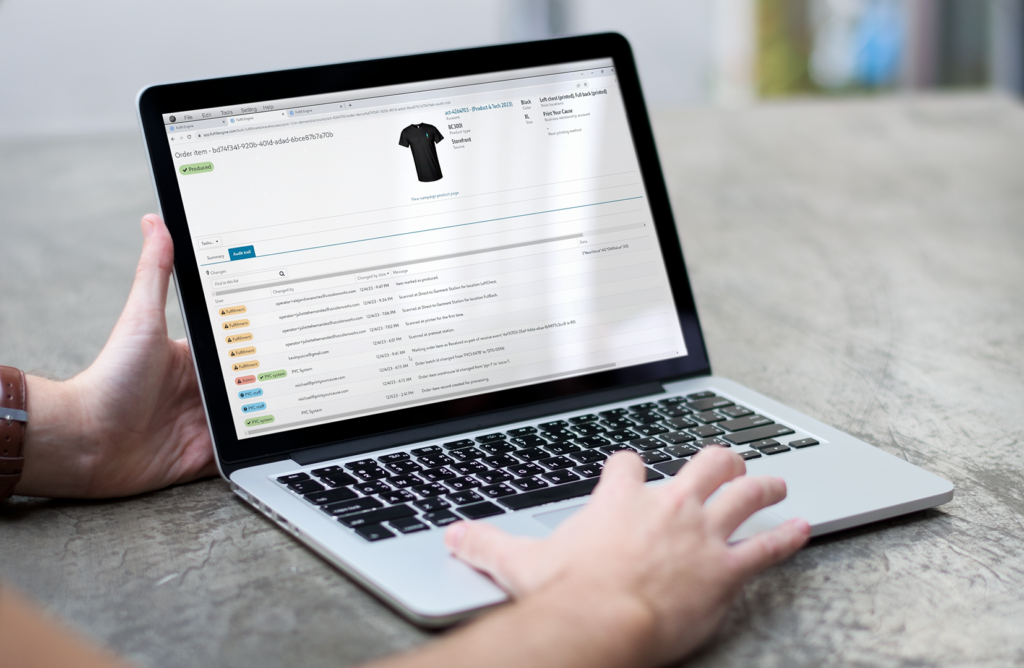
A common source of friction in the industry is when companies continuously evolve beyond their core product, creating unnecessary complexity. Brikl doesn’t want to be a supplier or decorator; we want to focus on e-commerce and use our technological advancements to improve the user experience for our customers.
“We aim to lead in technology as we grow, not just keep up. We are committed to advancing and pioneering the journey, using the latest technology to stay ahead. We listen to our customers and apply an engineering mindset to solve problems, always aiming to eliminate friction points,” Jason comments.
“For example, if we can save customers hundreds of hours a year through operational efficiencies, they can significantly increase their sales. That’s the goal—helping our clients grow their revenue through technology automating processes to free them up for more selling time”.
“Innovation is vital,” Jayson agrees.
“We don’t want to become complacent and stop evolving because things seem to be going well. That’s why our partnership with STAHLS’ is so valuable. They are at the forefront of printing technology, which complements our software technology perfectly. This synergy allows us to offer our Brikl platform users the storefront and fulfillment technology and cutting-edge production capabilities that keep them ahead of the competition”.
Capitalizing on existing customer relationships while exploring new markets
The industry is witnessing a significant boom, with 15 to 20% growth in acquiring new clients, which is a positive trend. However, we must recognize the potential in growing our existing customer base. When we come in with a whole new offering, it presents an opportunity to upsell and expand our relationship with current clients. Enhancing the client experience and introducing new programs can increase business with existing clients by 10 to 30%.
An existing client base represents a relationship built on trust. Expanding on these established connections is easier than constantly chasing new clients. While pursuing new business is important, the additional revenue within the current client base should be addressed. Often, it’s a matter of asking if new offerings would benefit them and educating them on possibilities they may need to know.
Existing customers can provide education on how to prospect new clients effectively. When you add new offerings to what you have historically provided your customer base, their feedback can help fine-tune your sales process for approaching new clients. Understanding what your customers value can provide a competitive edge, allowing you to come to the table with unique solutions others might not offer.
“While there is a love for direct embroidery and screen printing, the industry also has a vast, untapped market for innovative decoration methods, like heat transfers,” Rachel surmises. “This is where education becomes vital. We encourage reaching out to learn about new decoration methods that might not be currently utilized. Adding these to your repertoire can enhance what you offer your clients, pushing your services to new heights”.
The value of investing time and resources into smaller orders versus larger company store orders is often debated. With the advancement of technology and automation, even smaller orders become worthwhile. Automating processes from inventory checks to customer previews makes investing in smaller yet profitable orders feasible.
Wrapping Up
Brikl’s MicroStores concept exemplifies this technological integration. Designed to cater to a wide range of online stores, from corporate redemption programs to local pop-up shops, these MicroStores offer flexibility and customization. With Brikl’s platform, setting up an online store is not just about getting it up and running quickly; it’s about equipping it with all the necessary tools to succeed in a competitive market.
Looking forward, technology integration in online stores and fulfillment processes is set to redefine how businesses approach e-commerce. The insights shared by industry leaders during the webinar paint a picture of a future where efficiency, customization, and customer experience are at the heart of online retail.
The webinar concluded with a unanimous agreement on the need for continuous improvement and adaptation in the face of a rapidly changing market. As technology advances, so must the strategies and tools employed by online retailers. The collaboration between Brikl, STAHLS’, and Fulfill Engine is a model for others in the industry, showcasing the power of synergy and innovation in driving success in the digital age.
In conclusion, the “NextGen Integrated Stores and Fulfillment” webinar provided valuable insights into the future of online stores and fulfillment. Integrating advanced technology, customer-centric strategies, and innovative fulfillment solutions is key to staying competitive and meeting the evolving demands of the digital marketplace. As the industry continues to evolve, companies like Brikl, STAHLS’, and Fulfill Engine are leading the way in redefining the standards for online retail and e-commerce success.
